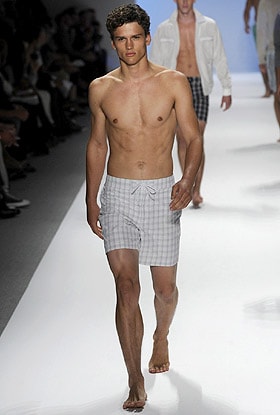In 2013, Forbes estimated that Simon Nessman was the third-highest-paid model in the world. "I've never made more than a million dollars in a year" he tells us, about their estimate that his salary was $1.1 million USD. But, in that same year, he enrolled in Squamish's Quest University, travelling to class via his sailboat, "Salal", from his home on Vargas Island where he owned a cabin that runs on wind and solar power (there is a gasoline generator as a backup). He scaled back his modelling commitments from once a week to once a month. Now, as the 27-year-old Courtenay, B.C.-native prepares to graduate in April, he talks about why he traded the catwalks of Paris for life on an off-the-grid island.
You've had this amazing career and you are continuing to model for brands such as Versace, Ralph Lauren and Fendi. Why was it important to you to make your education a priority?
I was burning out living in (New York City). I moved to Vargas Island, which is a very remote, off-grid, boat-access place.
The decision to go back to school came out of really falling in love with that lifestyle. And realizing that (modelling) was a bit of a selfish pursuit in the end and I should really go off and find a way to share these lessons that I have been learning with other people. Trying to contribute to society in a meaningful way and not just becoming a recluse.
I liked aspects of living in New York. I really appreciate it now for its culture and the music and the art that it has to offer.
While I was in New York a lot of my life revolved around pretending I was not living in New York City. I would drive out to Long Island to go surfing by myself all the time in the winter. I had a little wood shop in Brooklyn and I would spend days sitting in the shop and working on furniture and chairs and building surfboards.
I did enjoy it and I think it was great to move there at 17. I grew up really fast and learned a lot.
Your first shoot was for VMan with (former Yves Saint Laurent creative director) Hedi Slimane, and you were playing basketball in your underwear. You must have been like, what is this job even? What was your reaction to that at 18?
I think I was definitely a little bit uncomfortable in that situation and questioning what I was doing. That came up other times throughout my career, but for the most part I was able to listen to that gut feeling of doing what felt comfortable. That was definitely a strange transition from being a high school jock to all of a sudden being in front of a camera in my underwear for a fashion magazine.
As a model as well as someone who is concerned about the environment, what is your diet like?
I've been kind of lucky to never have to monitor my own diet. I make a point of staying very active…I don't eat a lot of red meat. CO2 emissions from livestock are greater than all transportation-associated CO2 emissions. Beef has the highest CO2 emissions, then pork, then lower down is chicken. I do think about that. I do eat chicken and I do eat fish, but in moderation.
What is coming up for you?
Right now I'm in the process of getting an ecological field station off the ground. Essentially I am creating the Cedar Coast Field Station for researchers and students to come and learn about the local ecology of Clayoquot Sound, which is a UNESCO biosphere reserve. I am giving them an opportunity to learn about that ecology in a nature-based setting.

What kind of mix do you see in the future between modelling and pursuing your interest in environmentalism?
It's an interesting thing that I've been thinking a lot about. I am able to take this career that I have as a fashion model and leverage that into getting this project off the ground. I really appreciate the ability to have a foot in each of these worlds.
I've been kind of lucky to never have to monitor my own diet. I make a point of staying very active…I don't eat a lot of red meat. CO2 emissions from livestock are greater than all transportation-associated CO2 emissions. Beef has the highest CO2 emissions, then pork, then lower down is chicken. I do think about that. I do eat chicken and I do eat fish, but in moderation.
What is coming up for you?
Right now I'm in the process of getting an ecological field station off the ground. Essentially I am creating the Cedar Coast Field Station for researchers and students to come and learn about the local ecology of Clayoquot Sound, which is a UNESCO biosphere reserve. I am giving them an opportunity to learn about that ecology in a nature-based setting.

What kind of mix do you see in the future between modelling and pursuing your interest in environmentalism?
It's an interesting thing that I've been thinking a lot about. I am able to take this career that I have as a fashion model and leverage that into getting this project off the ground. I really appreciate the ability to have a foot in each of these worlds.




No comments:
Post a Comment